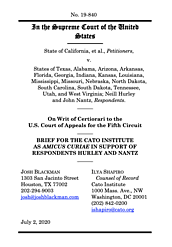Learn more about Cato’s Amicus Briefs Program.
“Sometimes small gestures can have unexpected consequences,” Justice Neil Gorsuch recently explained in the Bostock case that found the 1964 Civil Rights Act to include protections for sexual orientation and gender identity. “Major initiatives,” he added, “practically guarantee them.”
In 2017, Congress created another such “major initiative.” The Tax Cuts and Jobs Act enacted sweeping tax reform. A single provision of the law reduced the Affordable Care Act’s “shared responsibility payment”—the amount someone who doesn’t purchase a qualifying health insurance policy has to pay—to $0. At the time, many members of Congress maintained that this provision would not affect any other part of Obamacare. But this “small gesture” had significant “consequences,” which were not altogether unexpected.
The Supreme Court ruling in NFIB v. Sebelius (2012) narrowly upheld the ACA’s individual mandate after fusing it with the shared responsibility payment, and finding that the resulting chimera resembled a tax. This analysis was central to Chief Justice John Roberts’s “saving construction.” Indeed, the saving construction may be treated as a gloss on the ACA. But Congress’s zeroing out of the penalty peeled off that protective gloss. Only the unvarnished and unconstitutional individual mandate remains. And Chief Justice Roberts explained, “the ‘most straightforward’ reading of that provision [is] a command to purchase insurance.” That command is beyond Congress’s powers under the Commerce and Necessary and Proper Clauses, and there’s no longer a taxing-power construction available to save it.
Cato has now filed a brief in the new constitutional challenge to Obamacare. NFIB v. Sebelius held that the individual mandate, standing alone is unconstitutional. But the Court was able to save the mandate because the penalty raised revenue. Well, now it no longer raises revenue, so what does that mean for the ACA? Did Congress effect a do-over of that earlier litigation?
The Supreme Court should declare the individual mandate unconstitutional, and also the minimum-coverage provisions that are inextricably tied to it, known as guaranteed issue and community rating, or GICR—but not in all circumstances. It’s no longer prudent, or necessary to permanently enjoin GICR in all its applications, let alone the broader ACA. After all, Congress had the chance to repeal Obamacare and decided not to do that.
Instead, as Fifth Circuit Judges Andy Oldham and Jim Ho recently explained, the courts can “fashion a remedy that actually redresses Plaintiffs’ harms.” And the Justice Department concurs with this approach. Contrary to widespread belief, DOJ does not wish to invalidate the entire ACA. The solicitor general explained in his brief that “the relief the Court orders should be limited to redressing the injury actually incurred—that is, the relief should reach only the enforcement of the ACA provisions that injure the individual plaintiffs.” We agree.
The individual market ACA market has two segments: insurance purchased on the ACA exchanges and insurance purchased off the exchanges. The remedy for the latter market is straightforward: declare the individual mandate unconstitutional and, for off-exchange policies, the GICR unenforceable. This remedy would eliminate the requirement to buy ACA-compliant insurance and allow the plaintiffs to buy policies of their own choosing—presumably insurance providers would devise new products given the newfound regulatory flexibility—or none at all.
The analysis for on-exchange policies is different. Halting GICR with respect to policies sold on the exchanges would be an unnecessarily overbroad remedy. Plaintiffs cannot demand a greater remedy to alter all policies offered on government exchanges. Moreover, people who seek to buy a government-sponsored product on a government exchange cannot complain about cumbersome regulations.
Courts need go no further than issue a declaration with respect to individual market, off-exchange policies. As Justice Clarence Thomas reminded us in Murphy v. NCAA (2018), “the judicial power is, fundamentally, the power to render judgments in individual cases.” No more, and no less. The Court need not issue any remedy with respect to the ACA exchanges, group health plans, Medicaid, Medicare, and other elements of Obamacare.
This precise remedy offers the plaintiffs a genuine choice. Those who object to being forced to purchase unwanted policies, will have other options. And everyone else who likes their plan, can keep their plan.

This work is licensed under a Creative Commons Attribution-NonCommercial-ShareAlike 4.0 International License.


